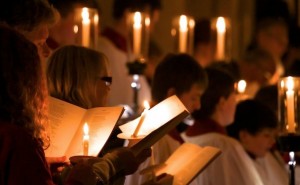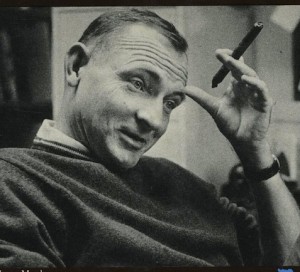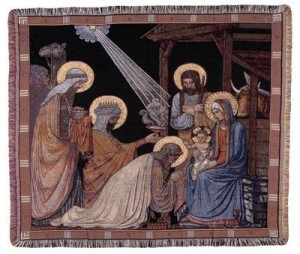I’m a Christmas music fanatic. A long row of Christmas music LPs still stands at dusty attention on my bookshelves. Names like Perry Como, Bing Crosby, the Kings College Choir, and Eugene Ormandy peek out from their spines. (My Christmas cassette collection was destroyed by a flooded basement), but CDs began replacing them long ago, the latest being a superb collection of new and traditional carols from conductor Simon Halsey, Rejoice! Christmas at Sage Gateshead. All the CDs have been “ripped” into downloads, and the only music presently loaded on my iPhone is about Christmas.
I had forgotten how superbly Glen Campbell sang “Little Altar Boy” — it doesn’t eclipse the memory of Karen Carpenter, but the same note of sincerity is there, and it’s touching. But my favorite right now, among all my Christmas recordings, is the Mormon Tablernacle Choir singing, “When Is That Goodly Fragrance Flowing?”
Some years ago — at a time that was not good for me –a week or so before Christmas I was flipping channels when I stumbled upon the Mormon Tabernacle Choir’s annual Christmas special. Kathleen Battle was the featured soloist, but it was this performance of the French carol ( Quelle est cette odeur agréable) “Whence Is That Goodly Fragrance” that both riveted my attention and lifted me out of the doldrums.
It’s one of most exquisite recordings of choral music I know, and if you ever have a chance to see it performed on TV, I urge you to watch it. It begins with the sopranos singing the first verse over an orchestral accompaniment. The second verse is sung almost pianissimo by the tenors, again with orchestral accompaniment. The third verse is shared by both women’s sections, but after the first few bars the orchestra suddenly goes silent, and the effect of the exposed voices in harmony is thrilling.
The experience of beauty in music, for me, is literally a “Sursum Corda,” a lifting of the heart toward the final happiness we are destined to share with God. Music is unique among the arts for its ability to penetrate us, to take the mind and body on a journey, away from division and toward unity. The beauty of music envelops us in its musical line, and through the impact of harmony and melody we find it easier to pray, to aspire to goodness, to believe in the underlying order of the world.
Religions provide guiding narratives for human existence — they address the question of origin and destination, the meaning of suffering, and the means to joy. Music, as no other art form, has a greater ability to help convince us that a paradise once existed and still does out of time, as it awaits us in the presence of God. Anyone who doubts what I say should listen to the “Dona Nobis Pacem” at the end of Bach’s Mass in B Minor (I would recommend Robert Shaw’s unsurpassed account on this little-known Christmas CD).
If the beauty of this breathtaking prayer for peace does not touch you, does not lift you out of the ordinary, then I would let Shakespeare issue you this warning:
“The man that hath no music in himself, nor is not moved with concord of sweet sounds, is fit for treasons, stratagems, and spoils. The motions of his spirit are dull as night, and his affections dark as Erebus. Let no such man be trusted” (The Merchant of Venice).



